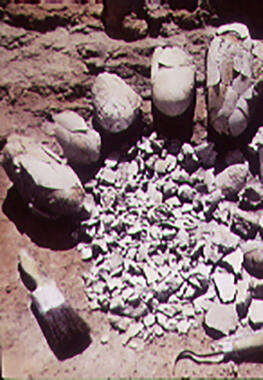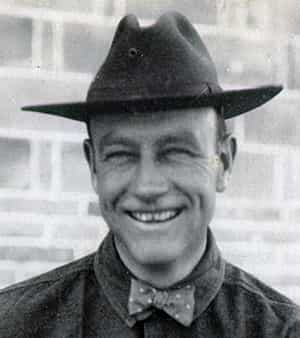The First AMNH Scientists to "Go Gobi"
In the early 1920s, Roy Chapman Andrews led a team of scientists on a fossil-hunting expedition to the Gobi Desert in Mongolia. The goal was to find the remains of modern man. They didn't find any fossils of early humans. But the team did make important discoveries, including nests of dinosaur eggs, the first-known Oviraptor, and the first-known Protoceratops. In fact, the species name for the dinosaur pictured is Protoceratops andrewsi. It was named in honor of the expedition leader!
Date of Birth: January 26, 1884
Hometown: Beloit, Wisconsin
Position: Director of the American Museum of Natural History from 1934 to 1941
Education: Ph.D., Columbia University
Known For: discovering the nesting Oviraptor and the first fossilized dinosaur eggs
Publications: All About Dinosaurs


Mongolia's Funniest Home Videos?
During Roy Chapman Andrews' 1925 expedition to the Gobi Desert, his team took many movies of the excavation. In one of these black and white films, Andrews and Walter Granger, the chief paleontologist, recreated their discovery of a nest of dinosaur eggs they had found two years earlier. In the 1920s, when these films were shown in America, people became wildly interested in paleontology. In today's high-tech world, however, the men in these grainy films look more like silent movie comedians than trailblazing fossil-hunters and explorers.
After the Central Asiatic expeditions, Roy Chapman Andrews went on to become:
an astronaut
President of the United States
Director of the American Museum of Natural History
Correct!
Andrews later became Director of the American Museum of Natural History.
The first scientists to discover dinosaur eggs were those on Andrews' 1920s expeditions to the Gobi Desert.
Fiction
Fossil dinosaur eggs were first found by scientists in France in 1859. These scientists thought they were the eggs of birds, then crocodiles, then maybe turtles.
These dinosaurs... parallel birds... in their almost wing-like hands and lightly built skulls.

Roy Chapman Andrews
paleontologist




 Biodiversity
Biodiversity
 Brain
Brain
 Genetics
Genetics
 Marine BiOLogy
Marine BiOLogy
 MicrobiOLogy
MicrobiOLogy
 PaleontOLogy
PaleontOLogy
 ZoOLogy
ZoOLogy
 AnthropOLogy
AnthropOLogy
 ArchaeOLogy
ArchaeOLogy
 Astronomy
Astronomy
 Climate Change
Climate Change
 Earth
Earth
 Physics
Physics
 Water
Water
